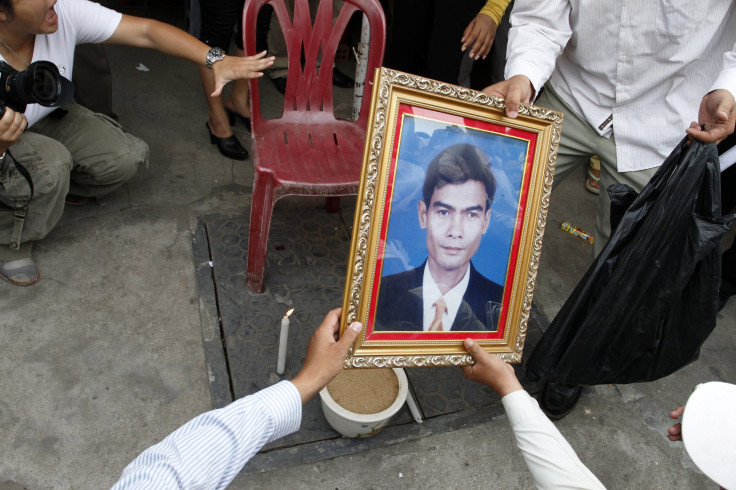A Dead Dissident Rises In Cambodia: Chea Vichea Stands Up For Workers’ Rights

A strange thing happened in Cambodia’s capital city of Phnom Penh on Friday.
Just off Sinanouk Boulevard, downtown’s main drag, a small ceremony was held to mark the unveiling of a modest statue. Visitors hung garlands of flowers over the figure’s arms, one of which gestures toward the West.
The statue itself is no bigger than life-size. It stands in front of Wat Langka, a centuries-old pagoda. The roughly depicted man is Chea Vichea, a labor activist who lost his life nine years ago.
In January 2004, Chea Vichea had been sitting down to read a newspaper in a public park when shots rang out. Seconds later, he was on the ground with bullet wounds in his chest and head. Newspaper pages lay scattered around his body as cracks in the sidewalk began to pool with blood.
Two men are now behind bars for the murder, but their 2005 trial was condemned by the international community. They are widely believed to be innocent, which would mean that the victim’s actual assassins are still at large.
That’s no surprise; Chea Vichea had powerful enemies. He led the Free Trade Union of Workers of the Kingdom of Cambodia and was one of the country’s boldest voices -- and most beloved figures -- in the fight against state-sanctioned oppression.
That’s why the statue took so long to go up: The government has denied permission for years, according to Agence France-Presse via GlobalPost. Its unveiling on Friday marked an odd departure from a decades-old narrative in Cambodia, which has one of the worst human- and workers-rights records on earth.
Cambodian Prime Minister Hun Sen and his cronies in the Cambodian People’s Party, or CPP, rule the country with an iron fist. In this Southeast Asian country of 14 million people, there is little hope for a regime change anytime soon. General elections will take place in July, but the CPP is all but guaranteed to coast to victory.
Hun Sen, 60, is among the world’s longest-serving national leaders. He first became prime minister in 1985, and he makes no secret of his desire to crush political opponents and rule for at least two more decades. The main leader of the Cambodian opposition, Sam Rainsy, exiled himself for fear of prosecution in 2005.
Of course, Hun Sen is not the worst dictator Cambodia has ever known. The nation has already endured Pol Pot, whose Khmer Rouge regime laid waste to Cambodia during the 1970s and resulted in the deaths of hundreds of thousands of people. Some were killed outright, while others starved or fell deathly ill as a result of disastrous policies.
Hun Sen was installed in Phnom Penh by the Vietnamese invaders who overthrew the Khmer Rouge, and his strong hold on power has stifled Cambodia’s development.
The human-rights situation in Cambodia is deplorable. Political dissent is suppressed with a heavy hand, and security forces sometimes perpetrate fatal attacks. Land repossessions and evictions are common. Detentions without trial -- or with sham trials -- are frequent. Workers’ rights are virtually nonexistent.
That was Chea Vichea’s driving cause. He was especially popular among the estimated 350,000 low-wage workers in the garment industry, who produce apparel sold by Western companies, including Wal-Mart Stores Inc. (NYSE:WMT), the Gap Inc. (NYSE:GPS), H & M Hennes & Mauritz AB (STO:HM-B) and the privately held Levi Strauss & Co.
For many citizens, sweatshop labor presents the best opportunity to escape the crushing poverty that afflicts one-third of Cambodia’s citizens, especially in far-flung rural areas where sustenance farming is a way of life.
Garment workers won a pay increase this year, bringing the minimum monthly wage to $75 from $61, according to the Financial Times, but many claim the raise did not go far enough to keep up with rising costs of living.
Gross domestic product per capita in Cambodia is around $900, which is on the very low end of the global scale -- comparable with countries such as Kenya and Kyrgyzstan. But economic growth is expected to reach 7.2 percent in 2013.
That’s due in large part to CPP’s strong relationships with multinational companies: A recent report by the Asian Development Bank found that foreign direct investment increased by 75 percent last year to hit $1.5 billion. But critics charge that those partnerships are strengthened by a corrupt system of governance, wherein CPP officials divert resources away from citizens, for instance by dispossessing residents to award massive land concessions to private companies, or by enforcing policies to keep wages low and attract Western outsourcers.
In other words, this growth is not the kind of change Chea Vichea fought and died for. But his new, state-condoned statue on a major boulevard at least marks a small victory in what is sure to be a very long battle for social change in Cambodia.
© Copyright IBTimes 2024. All rights reserved.






















